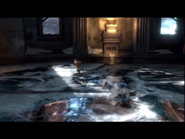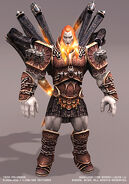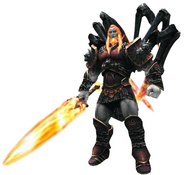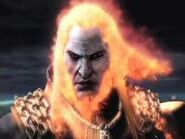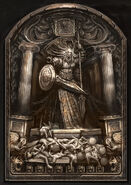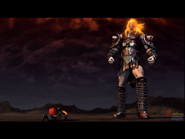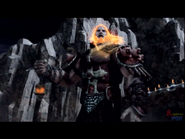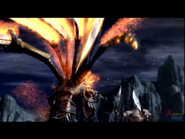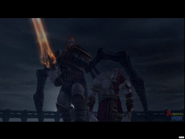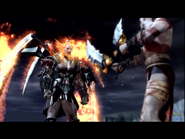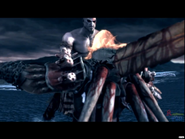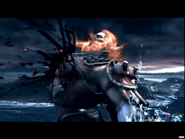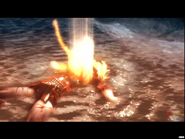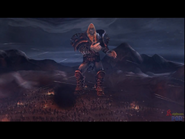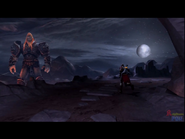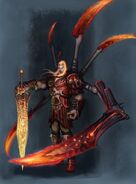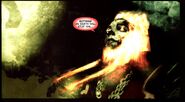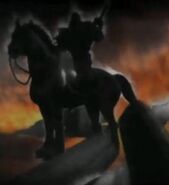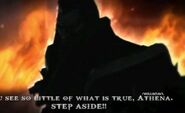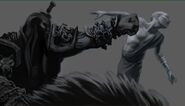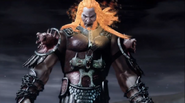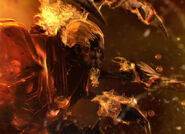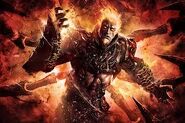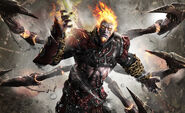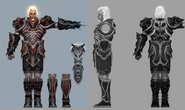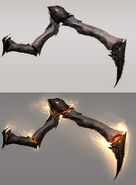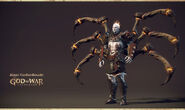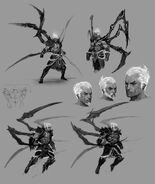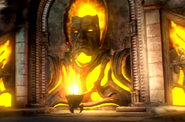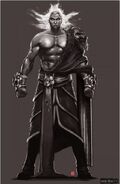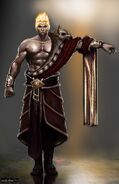
This article contains lore based on real-life sources of the Greek mythology as introduced from the God of War Greek era.
| “ | I have taught you many ways to kill a mortal, Kratos. Flesh that burns, bones that break. But to break a man's spirit, is to truly destroy him. | ” |
–Ares | ||
Ares (Greek: Ἄρης) was the original Olympian God of War, and the son of Zeus and Hera and the main antagonist of God of War, as well as the perpetrator behind the events of God of War: Ascension, meaning he was also responsible for setting the events of the series into motion by tricking Kratos into killing his family and turning him into the Ghost of Sparta, which eventually fulfilled the prophecy of the Marked Warrior who would destroy Olympus and end the reign of the Gods. Ares was the oldest child of Zeus and was commonly referred to as the most hated god on Mount Olympus by every god, even before being killed by Kratos.
Quick Answers

What role does Ares play in the God of War series?

How did Ares trick Kratos into killing his family in God of War?

What is the relationship between Ares and Zeus in Greek mythology?

Who are the parents of Ares in the God of War series?

How does the conflict between Kratos and Ares develop in God of War?

Greek Mythology
Ares was the God of War, son of Zeus and Hera, and one of the most prominent and powerful Gods of Olympus. He was born after the Great War of the Gods and Titans and served his father faithfully for many years. He was also a rival of Athena, his sister, because they were both gods, one of War, the other of Wisdom, and wished that the other would stand down. His Roman counterpart was Mars. Mars was held in much higher esteem, second only to Kronos; Ionic form of the Doric ἀρά (ara), "bane, ruin".
In the God of War Series
Early life
Ares was the oldest child of Zeus and Hera, born during the Great War between the Gods and the Titans that raged on for centuries. Being a natural born warrior, the first son of Zeus was exactly suited for what his father required. After the birth of Ares, other children of Zeus like Hermes, Artemis and Apollo would follow to fight for the establishment of Olympian rule, until Zeus ended the terrible war by banishing the Titans to the pits of Tartarus with the Blade of Olympus.
God of War
With the victory over the Titans, the reign of Zeus as the King of the Gods, the Heavens and the Earth began. His brothers Poseidon and Hades would become sovereign rulers of their own domains and kingdoms. Ares would attain his place as the God of War, one of the twelve ruling Gods of Olympus. As the eldest son of both Zeus and Hera, he would be known as the Prince of the Gods.
The relationship between Ares and the other Gods, including Zeus during that time is not really known, but it can be assumed that it got worse since after the birth of Athena, rivaling Ares in the domain of war and favoured by their father Zeus for her wise council and sense of strategy and diplomacy. The rivarly between the two War Gods began, spanning throughout the Age of Olympus where their interests often clashed, as they did during the legendary Trojan War.
At some point Ares took over the patron-ship over the Spartan city-state which was a highly militaristic culture, worshipping the God of War as their prime deity, next to his father Zeus. The Spartans and indeed other warring parties often made human sacrifices of their prisoners and captives to Ares, hoping to gain his favour for battles to come. The Temple of Ares in Sparta would become one of the most famous symbols of his power and presense in the mortal world.
It can be assumed that Ares participated in the war against the earth-born Giants, when they rose up on Gaia's behalf to depose Zeus and the Gods. However, as it turned out he himself had started to develop similar designs and plans for Olympus as his great-grandmother within the Earth. With the centuries his own lust for power grew, aswell as his resentment at Zeus' favouritism towards Athena, who he despised deeply.
Alliance with the Furies
Ares came to covet all of Olympus, especially Zeus' throne, so he struck an alliance with the Furies, and persuaded them to take a more ruthless approach. After learning of the prophecy of the Marked Warrior, who is destined to destroy Olympus and kill Zeus, Ares conceived a child with Alecto in the hope that their child would be the marked one so that he could aid him in overthrowing Zeus and claiming his throne. Unfortunately, Orkos, Ares' child, was not up to his standards and was disowned. The Furies, however, saw potential in Orkos and made him their Oath-Keeper.
Some time after deciding to use the future Marked Warrior for his own purposes, Ares commissioned his brother Hepheastus, the Smith of the Gods, to create the Blades of Chaos, in the deepest forges of Hades. Drawing from the primordial power and fire of Chaos and Tartarus, these wicked twin blades wielded great and dark powers, such as life-force absorption, rage and bloodlust inducement.
Ares took the Blades of Chaos and held them ready for his future servant on Earth, the Marked Warrior who would carry out his will in the mortal realm and eventually bring the very pillars of Olympus to ruin.
Encountering Kratos
Two Gods of Olympus, Ares, and Athena, on their fathers orders raided the city of Sparta in order to capture a child named Deimos, who had been suspected of being the mortal who would destroy Olympus in The Marked Warrior Prophecy. After Ares captured the boy, Deimos' brother, Kratos, charged toward Ares to save his younger brother. Despite his efforts, however, Ares brutally struck Kratos in the face and created a bloody scar on his right eye. Ares was about to kill the boy when Athena persuaded her brother to leave him be. Ares then left with Deimos, and Athena quickly apologized to Kratos.
Ares then took Deimos to the Domain of Death, where he would be tortured for many years by Thanatos, the God of Death. Little did Ares know that the boy to whom he gave a scar would be the same boy who would initially serve him and later leave him in adulthood after his family would be slaughtered by his own hands due to his machinations.
Wager of the Gods
Years later, the Gods created a contest/wager and chose various mortals as their champions for the capture of the Ambrosia from the Tree of Life within the Spire of Asclepius. In the Wager of the Gods, Ares choose Kratos as his champion and was confident that nothing would stop him in his quest for the Ambrosia. To ensure the Spartan would do everything in his power to gain the Ambrosia, the God of War has cursed Sparta with a terrible plague that would deform the new borns of the Spartans, condemning them to be thrown off Mount Taygetos according to Spartan Law. This would directly affect Kratos, as his daughter Calliope was afflicted with the disease.
Ares watched on as Kratos went on his quest to save his daughter and gain the Ambrosia for her and Sparta. He did not seem to intervene on his behalf and Kratos was not aware of his role and involvement. Like his sister Artemis, Ares refrained from boasting or declaring victory prematurely, unlike Hermes and Hades. After a grueling journey, Kratos captured the Ambrosia and thus made Ares the victor of the wager, much to the dismay of the Lord of the Underworld, who has saved his dying champion, the Barbarian Prince Alrik and put him on a path of revenge towards Kratos, who due to his success found himself at the beginning of a brilliant military career, rising through the ranks of the Spartan army, on his way to become a General.
Kratos' Servitude
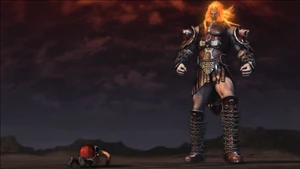
Kratos and his Spartan army were no match for the merciless Barbarian tribes of the east. Being outnumbered and overpowered, Kratos' army was losing the battle. Kratos, about to be killed by Alrik, now the Barbarian King, pledged himself to Ares, the God of War, in exchange for victory.
Seeing Kratos as the potential warrior that he needed to overthrow Olympus, Ares accepted. After Kratos finished his plea, the Heavens above the battlefield started to boil and burn, being torn apart by Ares’ divine powers as he descended from Olympus to answer Kratos’ call.
Larger than a mountain, with a beard and hair of living flame, the entrance of the God of War brought the whole battle to a standstill. Wasting no time, the Lord of Battles started to brutally and horrifically wipe out the Barbarians, expect for their King Alrik, who was shocked and struck by the turn of events, watching thousends of his men die a variety of most violent deaths. A pair of Harpies flew onto the scene of carnage and bestowed on Kratos the Blades of Chaos as a sign of his servitude. The Spartan would claim Alrik as his first victim with these cursed blades, which granted him ultimate power in the realm of mortals, but at a price yet to be paid.
To ensure that the Spartan became the perfect warrior and was bound to his will, Ares and the Furies devised three blood tests for Kratos, with the first having already been completed: spilling the blood of enemies. The second, spilling the blood of innocents, was easy to accomplish with Kratos' rising bloodlust as he ended countless lives with his Spartan companions, and conquered most of Greece, being ready to kill any man, woman and child percieved to be in defiance of the glory of Ares, his master. The last rite was spilling the blood of loved ones, which required more effort on Ares' part.
Sparta, with their General Kratos as Ares' direct servant on Earth rose to even greater devotion to the God of War. The armies of Sparta joined Kratos' conquests in the name of their God Ares, who has turned them invincible on their relentless march through Greece. Oppossing armies quaked in fear of the Fist of Ares and his Spartans taking the field against them. All the world trembled before the battle cry of Sparta when Kratos stood at their head. Total death, no quarter, no mercy and no prisoners was the outcome of any battle. The carnage and bloodshed became so great that even Zeus, high above on Olympus often considered to strike Kratos dead from the Heavens for his hubris and brutality against innocents.
Eventually, to finish his scheme and the last rite of the Blood Oath, Ares led Kratos to attack a village built in honor and worship of Athena. The Fist of Ares and his horde of savage murderers sacked the village and killed all who lived there, burning their homes to the ground in the process. Upon reaching a strange temple, Kratos was warned by the Village Oracle not to venture within its walls. Ignoring the old woman, Kratos, blinded by bloodthirst, killed all who were within the walls of the temple, including his wife, Lysandra, and his daughter, Calliope, among the peasents and villagers in the Temple, by Ares' will. The God of Slaughter appeared before the bloodstained hands of Kratos and told him that it was necessary to have his family eliminated so that nothing stood in his way.
The ashes of Kratos' wife and child were gathered by the Village Oracle who then placed them upon his skin as a permanent reminder of the monster he had become: the Ghost of Sparta. Enraged by Ares' deception, Kratos declared vengeance upon the God who once saved his life. Shattered by shame and loss, the former Fist of Ares swore that the God of War shall pay for this with his life, and that any man, beast or god that would stand in his way would die.
Both with Kratos and after their split, Ares directed many acts of violence and carnage in the mortal world, gaining new worshippers and increased power through such "shows of strenght".
After Kratos left Ares' service, the War God's son, Orkos, learned of the injustice that his parents had inflicted on Kratos and turned against his father and his mothers. Orkos sought counsel from the Oracle, Aletheia, who revealed Ares' plot to overthrow Olympus. When Orkos and Aletheia went to warn Zeus, Ares discovered their attempt and sent the Furies after them. Orkos escaped while Aletheia had her eyes torn out and hidden in the ruined Statue of Apollo. The Furies then ruthlessly hunted Kratos to force him to return to Ares' service for their plan to reach its fruition.
During Kratos' triumph over the Furies, it was revealed that Ares had wanted Kratos returned to him; the plan was ruined when Kratos killed the Furies and mercifully killed Orkos, who was remade the oath keeper to Kratos, and thereby severed his bond. Kratos managed to escape and served Olympus for 10 years, all while hoping to redeem himself as well as for his sins to be forgiven.
Challenge of War Gods
Upon seeing the extent of Ares’ cruelty, particularly with how he had Kratos slay his own family, Athena decided that her brother has gone insane in his bloodthirst and schemes, which she suspected were soaring to the very pillars of Mount Olympus itself. Having taken notice of Kratos herself, since encountering him together with Ares on that fateful night in Sparta, the Goddess of Wisdom deducted that Ares intended to use the brother of Deimos as the Marked Warrior, hence granting him near-Olympian strengh and toughness through the Blades of Chaos, a mighty weapon drawing its power from the primordial realm of Chaos itself.
The Goddess of War and Wisdom decided that her brother needs to be stopped, and the first step would be to make sure that Kratos would stay forever out of his reach. Coming up with a clever ploy, she approached Ares with a bargain or a challenge of unknown details, but the outcome was that Athena that won and would assume the total command of the armies of humanity, including Kratos. Ares on the other hand, would only count the dead warriors and monsters of the Underworld, aswell as the spawn of Typhon and Echidna among his armies. When later talking about it with Zeus, Athena claimed that her brothers "lust for bloodshed overpowered his reason" when he agreed to her bargain.
In the aftermath, Ares would realize the true meaning of her "bargain" and feel highly enraged and tricked, his rage at Athena and his father Zeus only growing by the day. The underhanded and scheming nature of his sister outright repulsed him. This was not lost on Zeus either, who told his daughter that Ares did not realize what exactly her bargain would entail.
The God of War stopped dwelling on Mt. Olympus and would spend his time on Earth, doing his duties in a more direct, personal approach. He would regularly send some of his monsters and undead legions to harass and try to kill Kratos on his quests and journeys across Greece.
Tension with Zeus
While his former servant Kratos was battling the Hydra on the Boat Captain's ship, Athena supplicates before Zeus' throne, asking her father to forbid Ares such assaults on her champion. After some consideration, the King of the Gods addressed Ares from the Heavens, the latter being on a rampage in an Egyptian desert, crushing armies of mortals beneath his steps. The God of War visibly twitched upon hearing his name, but ignored his father continuously which prompted a lightning strike so close to himself that the War God recoiled from the immense blast.
Ares lifted his face towards the sky, his face twisted with bitter resentment, the Rage within him palpable even on the highest levels of Olympus while he looks up from among the carnage in the war-torn Egyptian wastelands. He asks why his father disturbs him at his work, to which Zeus thunders back that it is not his place to ask, but to obey. The Lord of Olympus orders his son to come before his throne and beg for forgiveness, which Ares rejects and refuses to do, as long as Athena is there, for "the stench of her corruption repels all honest gods."
Zeus rises to his feet, asking him if he dares to defy him, to which Ares responds that his thunderbolt just caught him unawares and that he is welcome to come out into the world from his "honey-scented palace" to get him. The King of the Heavens warns his son that his Thunderbolt can strike even him, with Ares retorting that he is not scared of "lights and noise" and telling his father that if he thinks to bring war on him, he should not forget that War is his Kingdom. After another rant about his sister Athena, Zeus finally lets it go, unwilling to break his own edict and to personally reign his son in. Displeased with Ares' disobedience and lack of respect, the Skyfather goes along with Athena's request to arrange a meeting between herself and his brother Poseidon, to inform him about the Hydra and gain his support for Kratos' cause.
Standoff with Poseidon
Athena meets with Poseidon on one of the endless shorelines of Greece and apologizes to him for the Hydra currently in his Grave of Ships, portraying it as Ares' insolent incursion into his domain with a foul spawn of Typhon so that it could slay Kratos. Initially overcome with rage and desire to crush Ares where he stands, the Lord of the Oceans is swayed by Athena to choose a more subtle path, as there would be no shame for Ares to be bested in a fight with Poseidon himself. During the violent storm and fighting against Ares' undead forces, Kratos was met by a representation of Poseidon himself, who granted Kratos the gift of Poseidon's Rage. With this divine power, the Spartan was able to cast a stream of lightning through his body into his enemies. This ability would also be of crucial use while battling against the Hydra King, the strongest and largest of the Hydra's heads.
Ares, who was still rampaging in the distant Egyptian desert at the time, was furious to learn that Poseidon gave Kratos a sliver of his Rage and deducted correctly that Athena was behind it. The God of War and the King of the Oceans faced one another on the shores of Egypt, each as large as one of the old Titans, yet invisible to the mortal eye. Ares sneered at Poseidon backing an "mortal maggot" over his own family, to which Poseidon sharply stated that any further incursions into his domain will be destroyed and that Ares himself is not beyond retribution, promising that even if Zeus forbids murder among the Gods, Ares would wish he was dead once he would be done with him. The Lord of Battles loosened his Blade in his scabbard, telling his uncle that words are no armor against the edge of a sword. Poseidon flatly tells him to remember that he is souvereign over the Seas, and that all who enter it must honor him.
The tense standoff was eased by Ares verbally backing down and instead succeeding in casting doubts to his uncle about Athena and her schemes and motives, claiming the Hydra to be sent by her to cause friction between them both, and that he does not need a Hydra to kill Kratos, as he only allows him to live cause his suffering amuses him. The God of War informs Poseidon of his imminent march on Athens as "retribution" for her decieving schemes, together with his great armies from the Underworld. He claims to let the city untouched if Poseidon believes him to be a liar, to which the Sea God coldly replies that he couldnt care less about that city. Ares can burn it down and salt the earth for all he cares, which Ares is glad to hear.
Siege of Athens
Totally at the end of his patience and at the brink of rage-filled insanity, the God of War gathered his foul and innumerable army of Undead Legionnares and all kinds of monsters, ordering them to march at Athens and destroy the great city. Since Zeus had forbidden the Gods from waging war with one another, Athena could not step in to protect her city. Instead, the Goddess enlisted the help of Kratos, her champion who had faithfully served the Gods for ten years.
The city was entirely on the mercy of the God of War, and mercy was in short supply. Zeus notes to Athena in the novelization how Ares and the undead and monstrous armies under his direction have destroyed the great city more fast and throughly than he himself expected from his son, who "usually stumbles around like a Minotaur in a potter's shop".
Kratos, the former Fist of Ares and commander of his armies on Earth, was also surprised and impressed with the elaborate and subtle tactics, meant to maximise death to the fullest instead of just bloody meat waves that the Ghost of Sparta himself was familiar with from his former master. Overall, it became clear that Ares had overcome his original brutish tendencies and way of war, in favour of more strategic battle plans.
Indeed, Ares was working on a theory that Gods derived their power through mortal worship and that by targeting Athena’s followers and the Goddess herself (seemingly) not coming to their aid, they would abandon her and instead worship Ares who had proven himself superior thus potentially weakening her greatly. This theory even suggested that if mortals completely abandoned a God, said God could potentially just vanish, thus bypassing Zeus’s edict and Ares claiming victory over his hated sibling.
As the siege continued, the God of War deliberatly targets many of his fathers worshippers and his temples, which displeases Zeus. The King of the Gods, at Athena's suggestion orders his son Hermes to go into the burning city and aid the Priests of the Gods in their escape. He also once more offers Ares to explain himself and try to settle their differences, which his son again refused to do.
Meanwhile, Kratos was instructed by the Oracle of Athens to find Pandora's Box in order to slay Ares and began his journey through the Desert of Lost Souls towards the mighty Temple of Pandora, on the back of Cronos, the Titan Lord.
Antagonising Artemis
An entire army of Ares makes its way towards the besieged city of Athens through the wild woodlands next to the approaches to the city. The cruel undead warriors and monstrous beasts from Hades, on their relentless march destroy the woods and kill its animals, the domain and creatures of Artemis. Her brother Ares must have been aware that this would be highly insulting, but did not care.
Athena visits the private chambers of Artemis on Olympus, trying to find common ground with her sister in opposing Ares. After a tense beginning, the two were able to agree on their shared disgust for Ares' vile armies of the undead and monsters, who destroy and kill not to survive or to worship the Gods. With a promise that her woods would be sacrosant if Athens survives, Artemis sides with her sister and turns her creatures of the wild against the legions of Ares. Many were routed and destroyed by cunning and swift attacks and ambushes by mighty bears, elks, wolves and eagles. Even the powerful Cyclopes were not safe and were easy prey for the venomous vipers. So great was the dissarray and carnage among his army, that the God of War took notice himself and intervened from high above, ripping open the Heavens and stepping onto the wilderness and berating his minions for being driven like cattle by mere beasts and animals.
The God of Slaughter picked up her creatures of the woods in his titanic hand, upon which the Huntress of Olympus revealed herself and ordered her brother to let them go, her bow aimed straight at his face. Briefly startled, he regains his belligerance and refuses to comply, reminding his sister of their fathers edict. Unless she is ready to risk the wrath of Zeus, she cannot attack Ares and to prove the point the cruel god tightened his fist, blood and gore from Artemis' animals dripping down on the Earth.
As a response, the Huntress lowers her bow and turns it on Ares' army, in an instant it releases uncountable arrows which fly all over her wild domain, killing every monster and shredding every single undead soldier. For a long moment, the only sound was the mocking cry of a distant eagle. The God of War concedes and makes a truce with his sister, swearing to leave her woodlands in peace. This has aided the desperate defense of Athens. Without the neighboring forested regions as an axis of advance, the Athenian army could focus its efforts on the Battle at the Long Wall where the main assault of Ares' army now came from.
This incident has later prompted Artemis to bestow her powerful Blade onto Kratos, as a show of support for Athena and her champion.
Battle with Kratos
While Ares relentlessly tore Athens apart, he suddenly sensed that Kratos had retrieved the Box. Although he was impressed, Ares picked up a broken pillar and hurled it into the desert, which flew into Pandora's Temple and struck Kratos in the chest, impaling him to a wall and killing him. Ares' Harpies retrieved the Box and brought it to him. However, Kratos escaped the Underworld through the help of the mysterious Grave Digger.
Ares challenged Zeus and threatened to open the Box and use it against Olympus. It seemed all was lost, until Ares looked behind him and saw a returning Kratos standing behind him. He then mocked Zeus by his saying that he sent a broken mortal to defeat the God of War. Kratos, using his power granted by Zeus, took the Box from Ares' hands and opened it. The Gods' power was unleashed, and Kratos felt its magic pour into him, which caused him to grow into a giant (though Ares was still noticeably bigger than him). Kratos' strength matched Ares, and the ultimate battle for power began.
Ares claimed that Kratos was still just a mortal and was every bit as weak as the day that he begged him to save his life. Kratos recalled that he was not the same man that Ares had found that day – the monster Ares created had returned to kill him. Ares boasted that Kratos had no idea of what a true monster really was. Ares then unleashed large spider-like spikes from his back and was ready to finally kill Kratos for good.
Kratos gained the upper hand during the fight, but Ares trapped him in a pocket dimension where his family was attacked by an army of clones of himself (representing his mistake of killing his wife and child) and stated that there were more effective ways of killing someone than just physical harm. Though Kratos had managed to kill all of the clones, Ares mocked him, ripped the Blades of Chaos from his arms, and killed the image of his family with them. The two of them returned to the real world, where Kratos was emotionally beaten, and Ares boasted that Kratos should have been stronger and prepared to kill him with his Sword.
Zeus and Athena watched the fight from Olympus, Athena asking for Zeus and herself to intervene more directly to aid Kratos against the God of War, which Zeus instantly shuts down. The King of the Gods, radiating divine light of majesty and authority, stands from his supreme throne and towers above his daughter, proclaiming that Ares' blood will stain neither his or her own hands.
The Goddess of Wisdom and Strategems is speechless and in awe of the machinations and endgame of her father, recognizing that the Skyfather has been directing Kratos and indeed herself this entire time, to conveniently destroy his son Ares for him.
The King of the Gods declares that Kratos reflects well on her judgement - and on all of mortal kind. Zeus goes on to imply that grand rewards await the Spartan should he emerge victorious. His daughter asks about the matter of Kratos' visions, which her father bluntly denies, with Athena pushing back and trying to change his mind to no avail. Zeus was quite excited about the battle, proclaiming that this is the way it used to be, without all the leaping around, with swords and shields in the modern age.
Death of Ares
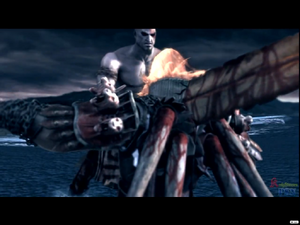
Kratos, however, spotted the Blade of the Gods (which had sent by Athena), dodged Ares' attack, took up the sword, and defeated him in battle with it. Ares pleaded for his life while reminding Kratos of the day that he had saved his life, and how he had only tried to make him a great warrior. Kratos ironically recanted that Ares had "succeeded" in doing that before he impaled him through the chest and killed him. The God of War fell into the Aegean Sea, and was no more, dead at the hands of the mortal that he controlled many years ago. Before his last breath, Ares released a loud death cry, which caused blood to burst from his chest, and a powerful explosion was released.
However, Kratos, having killed Ares, the one who made him kill his family, asked Athena to remove the nightmares of his past. Athena replied that even though he had been forgiven of his sins, the Gods nor any mortal could ever remove his memories of killing his family. Kratos realized that his nightmarish visions of his past sins would never leave him and thus tried to kill himself over Suicide Bluffs. Athena saved Kratos and said that the Gods could not allow him, who had done such good deeds for them, to die by his own hand. Athena then said that Ares's tactics and methods were brutal and while the Olympians mourned for their brother, Ares's path of destruction had to be stopped. However, with Ares's death, there was an empty place on Olympus for a new God of War: Kratos. Kratos then ascended to Olympus and was given the crown, throne, and title as the new God of War, which meant that the peace of Ares' death was broken and whenever there were wars, for good or evil, they would be sought by and given permission to by Kratos; the new, all-powerful, and immortal God of War.
After Kratos' success in defeating and killing Ares and becoming the new God of War, the Spartan citizens disowned Ares and hailed Kratos willingly (save for a few staunch supporters of Ares), and even removed all effigies of Ares and replaced them with those of Kratos. However, a few faithful Disciples of Ares attempted to revive their fallen God of War with the power of the Ambrosia (a power that could resurrect even a God), but Kratos had destroyed Gyges, the island in which the Ambrosia rested on, in order to prevent the followers of Ares' plans from coming to fruition.
The Olympians, even with Kratos amongst their midst, choose to restore the body of their fallen brother and entomb him in transparent ice. It is known that after his passing, the Gods held some sort of ceremony in his memory.
After Ares' Death
After Kratos was betrayed by Zeus and stripped of his godly powers, Kratos was rescued by Gaia, the Titaness of Earth, who told him that the Sisters of Fate had the power to help him go back in time, avert his betrayal and face Zeus. As he descended into dephts of Hades before Gaia's intervention, he saw a vision of Ares standing above the burning city of Athens, mocking the Gods of Olympus. On the Island of Creation, Kratos came upon a room known as the Garden of the Gods, in which there was a Statue of Ares where he was referred to as "The Fallen God of War". Kratos, after he faced many challenges to get to the Sisters, finally arrived at the Temple of the Fates where he met one of the sisters, Lahkesis. She told Kratos that no one could change their destiny and then began to fight him.
As Kratos hurt Lahkesis and began to gain the upper hand, she summoned her sister, Atropos, from within herself. Atropos quickly grabbed Kratos, took him inside the mirrors, and brought him back to the day where he faced and killed Ares. She threw Kratos on the Blade of the Gods that he used to kill Ares and become the new and great God of War. Then she tried to change his past by destroying the blade. With the blade gone, Ares would be victorious. In order to maintain his existence, Kratos protected the blade while he battled Atropos, eventually defeated her, secured his past, and trapped her inside the mirror.
The Second Titanomachy
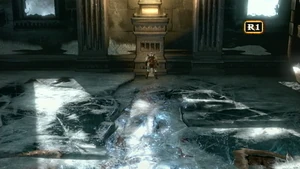
While he faced the Hippocampi on Gaia's hand, Kratos followed a path that leads to a chamber, the Tomb of Ares, which contained Ares' massive corpse that was concealed in ice. Kratos fought the first Centaur of the game there.
Despite being dead, Ares played a small role in the third game, as he was mentioned by Athena, Hephaestus, Hercules, Hera, Cronos, Zeus and Kratos, and was also shown in flashback scenes. His relationship with Aphrodite was also briefly referenced by Hephaestus, her husband. There was also a large fresco of Ares in the upper part of the Chamber of the Flame, which showed him wielding his trademark sword. That fresco was located right next to a fresco of his mother, Hera. Ares' voice was heard when Kratos ended up in his psyche.
With the death of Zeus and the near destruction of the world, Ares' plan for Kratos to take down the Olympian Gods and Mount Olympus came to full fruition, though not as he originally planned nor hoped.
God of War (2018)
Although he does not appear, Ares is mentioned several times in the game. He is once mentioned when Kratos indirectly recalls to his son Atreus how he made a deal with him to kill Alrik and how Ares continued keeping Kratos as a slave after that, via a story involving a horse, a hunter and stag, with Ares representing the hunter.
He is then mentioned at the end of the game, after Kratos kills Freya's son Baldur and she swears vengeance against him while taunting him about how he has not told Atreus his past. Kratos reveals to Atreus how he had made a deal with a God that cost him his soul and how he killed many innocent and guilty people after that, referring to his deal with Ares, his subsequent slaughter of innocents (including his first family) and evil people.
God of War Ragnarök: Valhalla
Ares appears in a flashback in a scrying pool after Kratos' oath stone was lowered into it, as it represents Kratos' memory of when he sold his soul to the God of War. Kratos, who felt regret for calling up on Ares that day to help stave off Alrik and his barbarian army due to the subsequent blood pact he made with Ares and the events that followed, was told by Týr that his act of doing so was not cowardly or selfish but rather more complicated than he let on and that he did so in order to save Sparta in the only way he knew how. Kratos then admitted that had he not called upon Ares and died at Alrik's hands, Alrik would have eventually invaded Sparta and violate and kill the women and children there out of revenge.
Multiplayer
| “ | Once your soul is in my grasp, warrior, I will grant you the strength to crush your enemies. | ” |
Ares was one of the mentors of God of War: Ascension's Multiplayer and the only mentor who was not a son of Cronos. His statue was the first one in the Rotunda of Olympus.
Overview
"With the powers of the god of war, a warrior of Ares is what some might call a "glass cannon": the best physical damage dealers from the game, but also the least resistant to damage. This makes Ares the opposite of Poseidon in Multiplayer. His warriors also have a natural bond with fire and heat, which makes them even more fierce by allowing them to keep burning and harming enemies even after an attack."
A Warrior of Ares could annihilate his enemies in a matter of seconds but must watch out for incoming attacks. The God of War's servants could survive in hordes of enemies by themselves, which made that the best class for Trial of the Gods.
Warrior
Dominant physical powers.
Fire Magic
Damage over time and disable enemy defenses.
Ares Items
Enhanced melee combat.
Ares Weapons
Grant damage bonuses and burn enemies over time in certain special attacks.
Ares Armors
Focus on enhancing physical powers.
Ares Symbols
Spear, helmet, dog, vulture, and flaming torch.
Appearance
Ares appears as a giant warrior god. He wears a brown sleeveless tunic, shoulder pieces with cerberus faces built into them, and has bracers and boots with chains on them. His boots go up to his knees. He has long hair and a beard, which seem to be made of fire. He can grow bladed spider legs from his back.
Personality
Being the God of War, Violence and Bloodshed, Ares is cruel, sadistic, and violent, as seen by him caring only about spreading chaos, destruction, and conflict across the world. According to Zeus, Ares only feels joy when destroying cities and nations. Ares is also extremely greedy and power hungry, as exemplified by his desire to destroy his father, so he can replace him as the new King of Gods and the ruler of Olympus. Ares' greed for power was not entirely without reason, as he did not originally plan to personally depose Zeus, like his father once did to Cronos, instead Ares planned for the Marked Warrior to do the deed, and in doing so avoid the same fate for himself. However, after having Pandora's Box in his possession and in the wake of his destruction of Athens, he was even arrogant enough to the point of openly calling out Zeus and challenging his rule, threatening Olympus itself with the power of the Box. It seems that atleast in the later part of his life he also had a poor relationship with his fellow Olympians, as they willingly helped Kratos and granted him a portion of their powers to help get rid of him.
Ares also considered love for one's family a weakness, which is evident by how he tricked Kratos into murdering his family, as he believed they hindered his servant from becoming a great warrior. He would later learn the hard way that he should have been careful with his expectations for Kratos, who slaughtered Ares in turn once he became aware of his machinations. This shows that Ares never cared much for his own kin, as he plotted to kill his father Zeus and disowned his son Orkos after he could not meet Ares' expectations. His relationship with his mother Hera and brother Hephaestus was unknown as he was not shown despising them. However, the fact that he had an affair with his brother's wife, showed he didn't care much for him.
As seen with his brief split with Poseidon, Ares could also be diplomatic and cordial when he wanted to. Instead of fully commiting to the confrontational cource of the standoff between the two, Ares choose to defuse the situation after initialy standing his ground against his uncles threat.
Ares greatly envied his sister Athena, as she was favored by Zeus and was always trying to prove himself as superior to her in every way, such as creating the perfect warrior for example. Eventually, his hatred and jealousy for his sister makes him attempt to destroy the sacred city Athens; however he was stopped and killed by Kratos, with the support of Athena herself. On the otherhand, Athena was more neutral to him and even told Kratos that while Ares' crimes were heinous, they still mourned him.
Ares' resentment at his fathers favouritism towards his sister, shows that he at some level cared for Zeus' approval, as also shown when he ranted towards the Heavens, asking Zeus if he now sees what his son can do and how misplaced his favour towards Athena is. His goal to usurp his father, was probably not just for the sake of power, but also to show Zeus once and for all what he is capable of.
Powers and Abilities
Powers
As the original God of War, Ares possessed a formidable arsenal of superhuman and divine abilities - all in correlation with combat and warfare, as these were his spheres of influence, even across time and space itself. His powers were considerably stronger than lesser gods. His mere roars of rage were enough to tremble the entire earth and infinite Skyrealm. As a major God of Olympus, the meta-physical power and dominion that he exerted over War itself, his "Kingdom" was immense, with whole armies being either annihilated or being turned invincible with his favour. Across time and space, he held power over conflicts and warfare far into the future itself, being fully aware of the future technologies of war.
Ares depiction in both the God of War game and novelization, as well as his combat hax displayed in his battle speak for his tremendous power and divinity, only truly eclipsed by his uncles and father Zeus, while some of his siblings like Athena and Artemis are relative to his power level. Befitting his name, Ares was a mighty fighter and one of the most powerful Olympian Gods.
- Pocket Dimension Manipulation: Ares was seemingly able to create what appears to be a physical pocket dimension that he could control completely. Ares demonstrated that during his battle with Kratos, where he trapped him in inside his own dimension, where he was forced to protect his family from doppelgangers, only for Ares to kill them after all, and almost broke his spirit. It should be noted that this was confirmed to be a real physical action rather than a illusionary creation as seen within God of War 2, as seen in a third person perspective. Furthermore, Ares was able to steal Kratos's weapons and magic from within the pocket dimension entirely. The extent of this dimension is significant, aswell as its cosmic nature with nebulas and stars in the background.
- Reality Warping: Within his dimension, Ares was in total control of what is real and not. He was able to conjure Athena's village temple out of nowhere along with Lysandra and Calliope.
- Enhanced Senses: Ares was able to sense how Kratos retrieved Pandora's Box while being dozens of miles away from the Desert of Lost Souls.
- Immortality: As a God, Ares was innately immortal; neither aging beyond his prime nor succumbing to mortal frailty such as disease or impotence of any sort. He could not be slain by earthly weapons; only divine forces and weapons such as the power of Hope, Blade of the Gods or other immortals such as Titans could slay him.
- Invisibility: Ares could turn himself invisible.
- Flight: Ares was seen descending down from Olympus when Kratos called for his aid, showing that he may have the ability to fly.
- Levitation: He was also able to levitate in mid air, while throwing his fireballs down on Kratos.
- Superhuman Strength: As a God of War, Ares has immense levels of godly strength, which allows him to be able to crush buildings effortlessly, make the ground shake by stomping and fight with Kratos after he was strengthened by Pandora's Box on equal terms, also being able to overpower and manhandle Kratos. In the novelization Zeus noted that for a time Ares had the upper hand against Kratos.
- Superhuman Durability: Ares possesses incredible durability as a God of War. During his battle with Kratos, he withstands an immense amount of punishment from him including being impaled his own back protrusions which only infuriated him more. Ares also shows to be very resistant even against divine weapons like Blade of the Gods although he was ultimately killed with said weapon.
- Power Nullification: Ares was able to strip Kratos of all his divine powers, gifted to him by the Olympians like Poseidon's Rage, Zeus' Fury, Medusa's Gaze and Hades' Army.
- Power Bestowal: Ares was able to grant the chosen warrior with a large variety of abilities and weapons, a power common among the Gods. It was he who gave Kratos his original blades, the Blades of Chaos. He also granted the Redeemed Warrior, if he chose to follow him, the highest amount of attack power as well as the ability to empower their weapons with fire to burn enemies.
- Pyrokinesis: Ares possessed the ability to manipulate fire, in every way possible. Ares was able to infuse it in his weapons, throw fireballs from his hands, and ignited people at will. Ares often used that ability to kill those who opposed him. Ares also used it in an aesthetic way, as his hair and facial hair were made of fire. Ares could also create homing fire projectiles in the shape of hounds.
- Weather Manipulation: When Ares descended from Olympus to help Kratos, the clouds split apart, and began to swirl around him, showing that he has some degree of weather control. The flames from his hair and beard boiled the clouds and his presense in Athens ripped a hole in the Heavens above him.
- Astral Projection: Ares was able to project an image of himself out of the fire to communicate to Kratos after the Spartan killed his family.
- Disease Manipulation: Was able to inflict a plague on Sparta, including Calliope.
- Shapeshifting: As an Olympian, Ares was able to alter his appearance at will.
- Size Alteration: Ares was able to alter his size, and often increased it to titanic proportions, as he did during the Battle of Athens.
- Transformation: Ares was able to sprout large, spider-like protrusions from his back that could be used in combat to hit and impale his enemies. Based on the fact that his statue in God of War: Ascension bore those "claws", it is implied that this was a trademark feature of the War God.
- Telepathy: Ares was able to talk to people through their minds, without physically getting involved with his target.
- Telekinesis: Ares was able to move objects and people with his mind and did that on a massive scale. Ares used the ability to rip the Blades of Chaos from Kratos' arms, and, during the Battle with the Barbarians, he lifted people in the air and broke them in half along with making their heads explode.
- Prayer Empowerment: Should be comparable to other gods such as Athena, who can gain power from mortals praying to them.
- Self-Sustenance: Should be comparable to other gods such as Kratos, who did not need sustenance.
- Acausality: Similar to Athena, the Gods of Olympus function on a different level of space and time compared to the normal laws. Furthermore, all Gods of Olympus were not affected by the changing of the timeline caused in God of War 2.
- Sound Manipulation: His mere roar alone shook the Heavens and the Earth.
- Teleportation: Throughout his battle with Kratos, Ares was able to teleport all around the area very quickly.
- Geokinesis and Geothermokinesis: Ares would occasionally summon enormously lava or volcanic rock structures to try to harm Kratos, as well as demonstrating the ability to shoot fiery rocks out of his hands.
- War Embodiment: As the original God of War, Ares was the embodiment of War itself and was able to draw power from it. War is his Kingdom that he rules on a meta-physical level. In combination with his other abilities, Ares was able to lay waste to huge armies with little to no effort. Just like Kratos when he took his divine role, Ares understood all the foreign and future technologies of war, aswell as the languages spoken by the warring parties throughout all time. He was able to turn the Spartan armies of Kratos invincible in battle. When he died, Ares' body exploded like a hydrogen bomb.
- Precognition: Should be comparable to Kratos, who when sitting on the God of War Throne, was able to see visions of wars up to 4000 years into the future, such as Normandy or Desert Storm.
- Weapon Creation: During his final fight with Kratos, Ares has shown the ability to materialize various weapons such as a gigantic war hammer, an axe, and a sword, all of which were enveloped in flames.
- Disarmament: Ares was able to disarm Kratos of the Blades of Chaos, which was not surprising given his connection to them. More impressive is how he was able to somehow take the Blade of Artemis out of Kratos possession.
- Cloning: When Ares teleported Kratos to his own personal dimension, he also produced numerous clones of Kratos, all of which were stronger than him. This ability is so powerful, that the clones even had duplicates of Kratos divine weapons like the Blades of Chaos and the Blade of Artemis, aswell as Zeus' Fury.
- Underworld Control: Ares seems to have limited power over the forces of the Underworld. The vast majority of Ares' army was made of undead monstrosities and he was confirmed to have direct access to the legions of Hades.
- Necromancy: It was stated in the Codex, that Ares can summon the dead to serve him (Though they were without souls). As the God of War, it would seem he has a claim on dead warriors, especially those who served him in life.
- Soul-Control: Though his legions are soulless, reanimated corpses, Ares also has power over souls. That extends to even Hades personal army of souls that he bestowed on Kratos, which Ares was able to claim for himself and use against the Spartan.
- Monster Control: Ares could control over a vast legion of monsters which served as the backbone of his army. In conjunction with his undead troopers, he was able to command Harpies, Minotaurs, Gorgons, and Cyclops, aswell as all the children of Typhon and Echidna, like the Hydra.
- Supernatural Marksmanship: As a God of War, he possessed a greater level of marksmanship as he was able to perfectly hurl a large pillar from Athens to the far-off Pandora's Temple in the Desert of Lost Souls to fatally impale Kratos.
Abilities
- Master Combatant: As an Original God of War, Ares was one of the most imposing and skilled warrior of Olympus, surpassed possibly only by his father, uncles and his rival, Athena. He had mastered all weapons used in the war including swords, axes, war hammers and his back spider-like blades which coupled with his godly powers and physical prowess made him even more formidable. Even after Kratos gains power from Pandora's Box, Ares proved himself to be an extremely hard adversary, fighting with the Ghost of Sparta on equal terms most of their battle and at one point nearly killed him despite ultimately losing to him. Ares is also extremely gifted in terms of his divine powers, which offer him a vast arsenal of combat based hax abilities that could easily decide battles in his favour, like his fight against Kratos which he would have won without the Blade of the Gods giving the disarmed and depowered Kratos another chance.
Gameplay
Ares is the final boss of God of War and is easily one of the most difficult bosses in the entire series. Being faced in a series of three consecutive battles with no respite between them, Ares has by far the longest boss sequence of the whole franchise.
Battle 1
Ares has very large HP so this fight can take a while. He also employs a wide arsenal of different and punishing attacks, the vast majority of which can be blocked, although he attacks fast and can be hard to predict. Ares will spend most of the beginning of the fight between axe swings, hammer pounds, spider claw stabs and tackles. Out of all of these the hammer pound is the most troublesome as it uses a ground shockwave that cannot be blocked and must be evaded or jumped, beware that it comes with a hammer swing afterwards. The axe swings and tackles are combo attacks, if the player get shit by a tackle, it will be followed by a claw stab and a punch sending them backwards.
As Ares loses HP, he begins incorporating new attacks. He utilizes a new hammer attack in which he charges at Kratos frontally before using the back of the Hammer which lets out a vicious wave of flames from the hammer's "mouth". He can also now use his spider claws more aggressively, extending them at Kratos in a multi-hit attack that can be used twice (one series per each of his right and left sides). Ares can also defend himself with his claws at times, which will be followed by the aforementioned claw attack. Both of these new attacks can be blocked.
Finally, as Ares has small HP left, it uses a new attack in which he teleports and starts bombarding Kratos with fireballs. These fireballs cannot be blocked and must be dodged repeatedly as they are launched rapidly. Ares is out of reach while using this attack. While the battle will be long, Ares will drop large amounts of Green Orbs and to a lesser extent Blue Orbs, allowing the player to regain their strength and keep in the battle.
Strategy
Ares is fierce and his attacks can do a lot of damage and leave little room to defend or evade while attacking him. It is better to tackle this fight defensively as Ares can brutally punish players who neglect defense, which is especially true in higher difficulties in which he can end the fight in a few blows. The Blades of Chaos are the preferred weapon as it is fast and has range that allows players to evade easier and be more on the alert of Ares' attacks.
It is possible to somewhat stunlock Ares with an aggressive approach. The Army of Hades is by far the best option for quick and dirty damage that can keep Ares locked due to the number of hits. This in conjunction with the Blade of Artemis can greatly damage Ares while limiting his attacks, although this relies on luck and the player being able to react in time and either block or evade whenever necessary.
All of Ares' attacks can be blocked except the hammer pound and the fireball attack. His attacks are executed quick but are also telegraphed by certain actions. His axe swing is announced by summoning his axe before slicing with it. His hammer pound has him summon his hammer with his arms above his head, this attack cannot be blocked but can be parried, however it will follow with a hammer swing, so players should evade as soon as they parry, or they will be stunned. The hammer pound is often used when Ares runs towards Kratos. His claw attacks are all announced by moving his claws in some fashion such as moving his claws to the front before trying to stab with all of them or moving his back to either the left side or right side, as he readies to extend his claws or block some attacks with them which is always followed by a side claw attack. All claw attacks have extreme range. His second hammer attacks have him summon his hammer while rotating it, he will charge Kratos with it before trying to burn him with the flamethrower at the back, the flamethrower, contrary to appearances can be blocked. Whenever Ares rises his hands with no weapon summoned, he will try to tackle Kratos which initiates a combo. Finally, when Ares uses his fireball attack, he will typically glow in flames before teleporting. This attack cannot be blocked and can be either evaded or interrupted via Zeus' Fury.
The Rage of the Gods can be used with impunity here as it will be refilled at the end of the fight. Use it for a large amount of damage, even more so if the unlimited magic bonus has been unlocked. Players are encouraged not to utilize burn their Magic meter too much, as it will be necessary to make the next battle easier. Ares doesn't drop as many Blue Orbs as he does Green Orbs, so preserving some Magic is encouraged. Ares will continuously stand still use this chance to attack and deal large damage to Ares.
The final sequence of the fight is tricky as it involved Kratos engaged in a strength contest with Ares which requires extensive O button pressing. The tricky part comes soon after, as the player is prompted into a Quick Time Event in which the correct button must be pressed twice to end the fight. The transition between O button and QTE is quite short, and it is common for players to press the O button during the QTE, which often means the sequence is broken, allowing Ares to regenerate, some HP, although the player can attack him before he restores too much. All in all, one should pay careful attention.
Battle 2
Kratos now faces doppelgangers of himself which intend to kill his family. If either him or his family die, it is a game over. The copies are not that durable, but they appear in swarms and there is a large number of them before the battle is over. As the battle progresses the house will break apartand the overall map will be reduced. A floating platform at the back will spawn a copy which periodically used Zeus' Fury to stun the player, allowing the rest of the copies to attack the family with impunity. Closer to the end of the battle, copies wielding Blade of Artemis will appear. These are extremely dangerous as they deal considerably more damage to the family than the other copies.
Strategy
Magic will come in handy here, which is why the player should have preferably a full meter bar from the previous battle. Army of Hades will be the player's best tool in keeping the clones at bay. Rage of the Gods with Magic Unlimited will also be a tremendous help, as the player can repeatedly spam Army of Hades and Poseidon's Fury, letting them crowd control effectively. Defeated clones will yield blue orbs. The Blades of Chaos are also the better weapon for crowd control here through Plume of Prometheus (Square, Square, Triangle).
Don't let the clones, close to you as it can trigger a grab sequence in which you must shake them off, losing you precious time and momentum. Grabing the clones is an instant kill but is ill-advised as it takes a long time to kill one and there is a swarm to fend off. Simply spam the strongest attacks available and save nothing, for neither the Magic nor Rage meter will be necessary for the next battle. It is, however, a wise idea to reserve a cast of Army of Hades in case the family needs healing as the clones can interrupt you.
If one doesn't not succeed, they should not be discouraged, as the battle does rely quite a bit on luck. If they feel like they don't have enough magic at the start, consider restarting the first battle and ending it with more magic.
Battle 3
The final battle and a potentially frustrating one. The fight is a tug of war between both fighters as they try to fill their own bar at the expense of the other, this leaves ample room to recover for both parties. However, Kratos has neither Magic nor Rage meter and his attacks with the Blade of the Gods are far simpler than Ares' attacks which are more complex and far more devastating. Ares' new attacks include a sword combo that can be blocked. His own version of Army of Hades which can be blocked as well. A magic attack in which Ares will teleport before summoning 4 giant rocks which will collide and explode, which cannot be blocked. By far his worst attack is a hand blast that cannot be blocked and will leave Kratos stunned, which is always followed by a claw multi hit attack which Kratos will not be able to evade or block while stunned resulting in unfair one-sided damage that can let Ares gain a lot of advantage or regain a lot of his own lost gauge. In higher difficulties this combo can instantly turn the tide of the battle or be an instant kill. Ares will continuously run towards the player which is almost always either a sword combo or a hand blast. He will periodically roar after using some of these attacks.
Strategy
Players should prioritize defense here as offense is not in their side, evade Ares and attack only when an opportunity rises as you do not want to risk a hand blast or the claw attack that comes after. Do not bother with the Blade of the Gods' techniques as they aren't as powerful nor nearly as effective at draining his gauge and are slow in nature. By far the best way to deal damage against Ares involves a sequence in which Kratos clashes swords with the God of War, this allows the player a QTE in which they are prompted to spam the O button. Should they succeed, Kratos will perform a series of sword attacks which will deal enormous damage to Ares and leave him stunned afterwards allowing one to deal more damage.
In order to trigger the sequence, one must attack Ares until he blocks with his own sword and keep attacking until the O button prompt appears. There is a caveat, however, Ares can block Kratos' attacks in a way that the sequence won't be triggered and will result in a counter. The best way to determine whether the sequence will be triggered is if Ares was made to flinch before he blocked, if he took damage but did not flinch and blocked, then evade, as the sequence will not be triggered. If Ares flinched, took damage and decided to block, then continue. Take advantage of whenever Ares roars at the end of some of his attacks to slam him and trigger the sequence. Another chance to deal damage comes when he teleports. He will always teleport to the upper part of the map in the middle before casting his rock attack. There is quite a delay before the rocks are summoned, use it to land anywhere between two and three hits before rolling away. There is also some room for damage right after the rocks explode as he won't attack immediately. Worth noting that, although rare, Ares gauge can be depleted as he readies this attack, if this happens the battle won't end until he finishes this move. Once he is hit one more time the battle should end.
Relationships
Zeus
Unlike most of the other Gods, Ares ignored Zeus' orders and had no fear of Zeus' wrath, to the point that he challenged his father several times while mocking him for sending a "broken mortal" to fight him, instead of facing Ares by himself. His feelings towards his father were defined by resentment and hatred, in great part due to his relationship with Athena. In a conversation with Poseidon, he made a comment about Zeus foolishly indulging "every petty fancy" of his sister.
However, its also clear that Ares cares for and despite all his schemes and rhetoric desires the approval of his father. Even while threatening Olympus with the power of Pandora's Box, he asks whether Zeus now realizes what his son can do. It can be assumed that their relationship was better before the birth of Athena, during the Great War and the beginning of Olympian rule. It could have even remained on good terms if Zeus would not have such blatant favouritism towards his sister, who was an obvious rival and counterpart to Ares from the start. If anything, as the Prince of the Gods and Zeus and Hera's first son, Ares had expected such favour to be bestowed on himself, but when he saw Athena's ascent within Olympus as Zeus' right hand advisor and favoured child he must have felt that he could never satisfy his fathers expectations, which with time turned into bitter resentment and eventually hatred.
Athena
Ares has a deep hatred for his sister, as he refuses to even stay in Olympus when she is around during the last years of his life, as he could not stand the underhanded way in which she tricked him during the Challenge of War Gods. Ares considers Athena a weak schemer and liar who decieves and lies to Zeus and the rest of the Gods in order to persue her petty goals. Ares is always trying to prove himself as superior to the Goddess of War, or attacking her in every opportunity, as when he would command Kratos to attack the villages and cities that were sacred to the Goddess. Ares envies the amount of respect and worship that Athena receives from other deities and mortals, while he himself is hated and despised.
However, it seems that they originally had a less intense rivalry and were capable of working together. They once worked together to capture Deimos on Zeus' orders, because of the latter's fears of The Marked Warrior prophecy. During this task, Ares tried to kill a young Kratos for attempting to attack him to save his brother, only for Athena to dissuade him, which angered him. However, he ultimately listened to his sister, and spared the boy’s life.
Poseidon
Ares relationship with his uncle Poseidon is not broadly portrayed in the series, save for one chapter in the first novelization. Based on that, one can describe his attitude to the Lord of the Oceans as respectful and diplomatic, but not submissive, though he knows when to back down. After learning of his uncle having granted a sliver of his own Rage to Kratos, the War God is outraged and during his meeting with the Sea God seethes at him "backing a mortal maggot" over his own family.
After a rather severe threat by Poseidon, Ares does not submit and loosens his sword in his scabbard, daring him to go ahead and deliver on his words. Realizing that the reason for his uncles current belligerence is the incursion of the Hydra into his domain, Ares choose to defuse the standoff and instead deny responsibility for the foul beast, strongly implying Athena to have actually been behind its presense in the Aegean Sea, aiming to cause a split between himself and his "lord uncle", so that he would "turn his majestic face from me".
Ares went so far as to inform the Sea God about his imminent march on Athens and gave his uncle a chance to veto the entire attack, out of suppossed respect, as he is aware of Poseidon's former interest in the great city, and the many tributes he still recieves from it ever since. By showing respect and a little bit of flattering, he was able to pacify Poseidon.
Kratos
Back in the days when Kratos was still his servant, Ares considered him an almost "perfect warrior", possibly because they both shared the same rage, hatred and love for bloodshed. Ares taught and trained Kratos further in the art of war and brutality. However, unlike Ares, Kratos still loved and cared deeply for his family; feelings that were considered a weakness by the God of War. After Kratos abandoned Ares due to being tricked into killing his family, the warrior god started to despise Kratos, considering him just a "broken mortal" with no value and saying he was every bit as weak as the day the Spartan begged Ares to save his life. When facing the Spartan for the last time, he declared that Athena made him weak. After being proven wrong in a hard fought battle, Ares was not above pleading for his life, even if it seemed very unlikely to succeed.
Before that, when he had the upper hand and was about to slay Kratos, he stated that he should have remained on his side and been stronger, also expressing genuine outrage within his dimension at Kratos having rejected him, a God of Olympus to whom he was bound by oath. He has no sympathy for Kratos' loss of his family and infact berates the Spartan for thinking he could gain ultimate power without paying a price, finding his current attempt to "save" his long dead wife and child to be pathetic and feeble minded.
Centuries later, Kratos recounts the story of his service and vengeance upon Ares to his son, Atreus. He compared himself to a horse who sought vengeance against his enemy, a stag who metaphorically represented Alrik. Ares was presented as the hunter whom the horse made a deal with: service in exchange for victory. So the horse took the hunter's bit and bridle and allowed the man to ride on his back and together, they killed the stag, but the hunter would not allow the horse his freedom and made a slave of him. Atreus ponders whether the horse sacrificing his freedom for revenge was worth it, but Kratos answers that it was not. Kratos also made it clear that he doesn't regret that he killed Ares.
Gallery
Trivia
- Ares is technically responsible for the events of the Greek-era games of the series: by tricking Kratos into killing his family, he would set him on the path that would lead to Olympus' destruction.
- Ares is among the very few characters to successfully kill Kratos like Charon, Zeus and Thor.
- A secret video of the original game had Kratos revealing that he trapped Ares' soul inside a secret room, and he will eventually use it against the gods. It is never mentioned again and by the end of the third game, it is unlikely it will be brought up ever again.
- Ares was voiced by Steven Blum in God of War and God of War: Ascension, and by Fred Tatasciore in God of War III. Interestingly, he shared the same voice actor (Steven Blum) as Lucifer from the animated movie of Dante's Inferno, a game that shared many gameplay mechanics and themes.
- Ares' appearance changed dramatically during the development of God of War. Originally, David Jaffe had intended for the god to appear as "ninety percent energy and ten percent material", but because of the limited power of the PS2, Ares' appearance was gradually stripped back to the warrior seen in the final product.
- During the final battle, after Kratos is robbed of his blades and magic, Ares will use the Army of Hades ability, implying he has some degree of power stealing or perhaps, with him being a God, can also withdraw blessings or powers other Olympians have given him. It's also possible that it was actually his own version of the same ability, since commanding "Armies" would be a principle for the God of War.
- Because he was killed by Kratos, it was rather unlikely that Ares had a chance to be affected by the evils of Pandora's Box, as he did not truly display any characteristics of the evils the Box contained. As such, Ares' threat to attack Olympus as well as his bloodthirsty ways were already part of his own character.
- Ares is technically responsible for Kratos' standard appearance (with the exception of the scar on the latter's abdomen). He attacked Kratos when the latter was a child, giving him a scar on his right eye and then took Deimos away, leaving Kratos to think his brother was dead and thus causing him to tattoo himself in a way similar to Deimos' birthmark. He also tricked Kratos into killing his own family, thereby causing their ashes to attach themselves to his skin. He even gave Kratos horrific burns on his forearms upon searing the Blades of Chaos to them.
- It is unknown why, even if he was an enemy of Kratos, his illusion was used by Gaia in God of War II to encourage Kratos to fight back and revive himself after his death at the hands of Zeus.
- Ares' human-sized avatar was only seen in Ghost of Sparta: in flashbacks that showed him taking Deimos away and scarring Kratos.
- This makes him along with Hephaestus the only god that was only phisically seen as a giant everytime he was on screen. In fact. In the Original God of War, no god was ever shown to have human proportions, as Athena was just a statue and Zeus was using a disguise.
- Ares was one of the mentors for God of War: Ascension Multiplayer. That made him the only mentor who wasn't a son of Cronos: he's his grandson instead.
- Strangely, when Ares is killed, there is no Earthly consequence of his death as was the case for other Gods, such as Poseidon's death causing massive flooding or Helios' death causing the world to be covered in darkness. While this phenomenon was only implemented many games after the original God of War when Ares was killed, no explanation is provided for the lack of consequence of Ares death. This may be because he wasn't the only God of War, since Athena was still alive at that point. However at the end of the game Athena herself tells Kratos that a new God of War was needed, as was the reason they choose him to replace Ares.
- Ares was depicted as having hair and facial hair made of flaming energy, although when his corpse is seen in God of War III, his hair is simply normal red hair.
- Ares was ranked on 55th place of the Top 100 Video Game Villains on IGN.
- Ares was the only God in the series shown with the ability to grow retractable blade-like spider legs from his back. It remained unknown if there were other Olympians with that ability or if it's unique to Ares. Megaera, one of the Furies, had spider-like legs growing out of her back: their appearance was very similar, though more insect-like, compared to Ares' but they were not on fire, and they seemed to be truly a part of her physiology.
- Based on Ares' appearance in God of War: Ascension, his ability to grow those spider legs wasn't a secret to the Champions of Ares. In other words, Kratos would have known that Ares had that ability as was implied by Kratos' complete lack of surprise. The legs were mostly a surprise for the player.
- It's also possible that the ability was simply an extension of his shapeshifting. Seeing as other gods like Poseidon or Zeus could turn into animals or create living creatures out of their bodies.
- The Champions of Ares had a natural bounding with fire and gained energy from battle as revealed in Ares' Trailer of Ascension.
- In God of War: Ascension, Ares was seen with shorter hair and beard than in the other games. The reason of the change was still unknown.
- It was most likely, however, that Ares, like the other Gods, could change his appearance depending on whatever suited him.
- Since Ares' appearance in Ascension is shown in flashbacks, it is possible this was Ares' appearance prior to Kratos' birth or as the game took place ten years prior to the original game.
- The first option seems more likely. Because in the flashback scenes in God of War (2005), when Kratos declared his loyalty to Ares, Ares' hair and beard were long.
- Ironically, Ares lacks a mustache with his facial hair, a gesture which is seen by most cultures as a symbol of non-violence and pacifism. Mustaches are strongly associated with military services and thus removing them was considered a symbolic gesture of rejecting militarism.
- One of Ares earliest concept arts did show him with a moustache, it's not known why it was removed.
| |||||||||||||||||||||||||||||
| |||||||||||||||||||||||||||||
| |||||||||||||||||||||||||||||
| |||||||||||||||||||||||||||||


